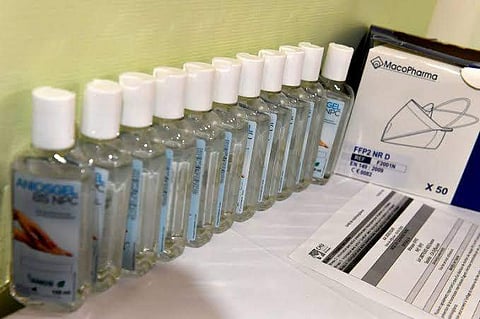

Hand sanitiser makers in the last month have seen up to a ten-fold jump in demand, as the number of COVID-19 cases in India is on the rise. Companies have increased the production amid reports of non-availability of hand sanitisers in the market, as people have started panic-buying amid lockdown across the country.
On March 19, the Central Government capped maximum retail price of hand sanitisers at Rs 100 per 200 ml bottle till June 30 this year amid a sharp rise in the prices of this product. However, this might have led to an unprecedented increase in the prices of raw materials like alcohol used to make such products. Rahul Dhanuka, director of a personal care manufacturing company called Samriddhi Life Sciences in Kolkata, spoke to us about the problems faced by medium or small-scale manufacturers due to the government's sudden cap in prices. "Our sanitisers have a 70 per cent alcohol base and a secondary disinfectant, which helps in the proper removal of bacteria and germs. The Government directed price cap has caused a massive problem for people like us — the small and medium manufacturers. Alcohol prices have gone up tremendously in the past week. For us now the production cost is higher than what the Centre is asking us to sell at. We might stop manufacturing at this rate as it will lead to a commercial loss," he says.
The manufacturer adds that they are still selling from the previous stocks. They also distribute their sanitisers to institutes, companies that can give it to their associates and employees. They have currently stopped selling in the retail channels. "We can't stop completely as there should be no shortage of this material right now. We are giving it away to hospitals as well at minimised rates. For us, the chain starts from the manufacturer to distributor to retailer and then adding the government tax and finally reaches the consumer. We will not be able to sell it below or within Rs 100, as currently, the production cost has gone up. A 200 ml bottle would cost Rs 70-75 to manufacture, where it normally costs us Rs 45-50," he explains.
However, the government declaration on March 19 stated that the prices of alcohols used in manufacturing hand sanitisers have been capped under the Essential Commodities Act on account of the COVID-19 outbreak. The decision would empower the central government and states/union territories to regulate prices, production, sale, distribution, transport, movement, storage, information of alcohols used in manufacturing hand sanitisers, used as a preventive measure to avoid infection from COVID-19, the Ministry of Consumer Affairs had said in a release. Disagreeing with this, the manufacturer says that it might not have been properly implemented across states yet and it has become quite difficult for them to cut down the cost of sanitisers. "I don't think we will be manufacturing anymore in the coming weeks. However, at least hand sanitisers have now become a part of the Indian lifestyle, earlier it was more of a western phenomenon. People used to wash hands and that was it. But hand sanitisers are here to stay now. There will be a market once the lockdown is over and we could do better I hope. We will reassess and see what the prices are and then begin afresh," he adds. Rahul's company has tie-ups with NGOs and charitable organisations, to whom, he is still supplying sanitisers at a minimal cost. He is charging at the regular rate from private companies, who then distribute it to their staff and employees across the board.
This, however, is not the case when it comes to bigger players like Savlon, Dettol, Godrej, Himalaya and several others, as per various news reports. The Himalaya Drug Company CEO Philipe Haydon reportedly said, "We are ramping up our production line to cater to the demand of sanitisers and handwashes nationwide that can help people take precautionary measures. We launched awareness drives on hand hygiene in the year 2000." FMCG firm Godrej Consumer Products Ltd (GCPL), which is also present in the hand sanitiser segment, has also increased the production of Protekt hand sanitisers and hand wash. "We have ramped up our production capacity. We are also trying to ramp up through our vendors," Godrej Consumer Products Ltd CEO (India and SAARC) Sunil Kataria said. ITC, which is present in the segment through its brand Savlon, said it is ensuring that there is an adequate supply of hygiene products in the market. "ITC is ensuring an adequate supply of Savlon hygiene products in the market. Savlon continues to focus on enhancing awareness about hand hygiene and urges consumers to maintain good hygiene practices," according to an ITC spokesperson.
